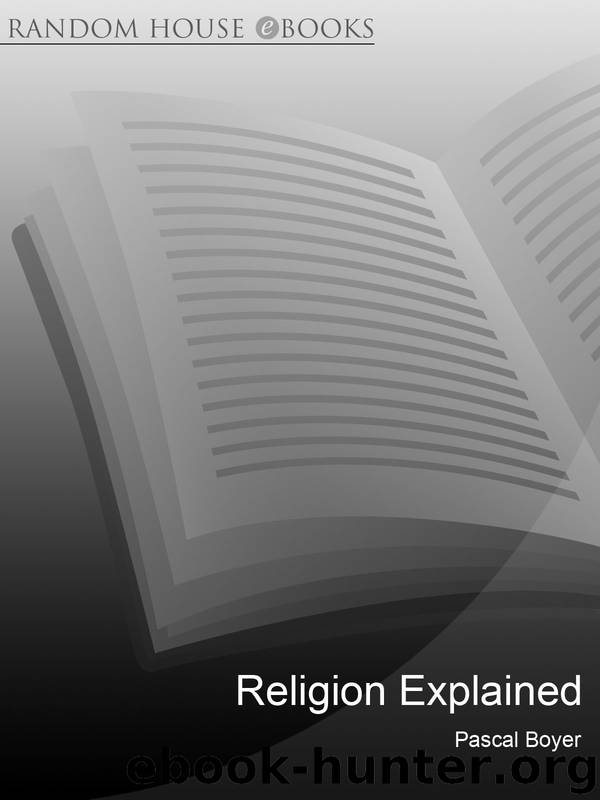Religion Explained by Pascal Boyer

Author:Pascal Boyer [Pascal Boyer]
Language: eng
Format: epub, mobi
Publisher: Random House
Published: 2002-11-06T16:00:00+00:00
Chapter Six
Why is religion about death?
DEAD PEOPLE, LIKE vegetables, can be pickled or preserved. You can also abandon them to the beasts of the field, burn them like rubbish or bury them like treasure. From embalming to cremation, all sorts of techniques are used to do something with the corpse. But the point is, something must be done. This is constant and has been so for a long time. Early modern Humans, our direct ancestors, buried their dead from the Palaeolithic onwards. Even our Neanderthal cousins may have buried theirs, although the facts are still disputed. For obvious reasons, it is not easy at all to distinguish purposefully buried bodies among the sets of bones found under layers of sediment. For modern Humans, however, the evidence is much clearer, since people were buried or laid down with flowers, tools or other artefacts. Some archaeologists have pointed out that burying the dead may have been a measure of protection against scavengers attracted by decaying bodies. However, one must remember that early Humans were nomadic foragers, which would make it easy for them to avoid such invasion. Be it as it may, the fact that early Humans did decorate corpses, laid down the bodies in particular postures or buried them with flowers, aligned horns or tools would support the notion that some ritualisation of death is a very ancient human activity.1
Ancient findings are often reported as evidence for the claim that early modern Humans or even Neanderthals ‘had religion’. Whether valid or not – I will return to that in another chapter – the inference shows how confused our common ideas about religion can be. We assume that burying the dead in a ritual way is evidence for supernatural concepts – ancestors, spirits, gods – because we find a connection between these two phenomena in most human societies. But what is that connection?
All religions, or so it seems, have something to say about death. People die but their shadows stay around. Or they die and wait for the Last Judgement. Or they come back in another shape. The connection between notions of supernatural agents and representations about death may take different forms in different human groups, but there is always some connection. Why is that so? One straightforward answer is that our concepts and emotions about death are quite simply the origin of religious concepts. Mortality, it would seem, naturally produces questions that religion answers and emotions that it helps alleviate.
We know that human minds are narrative or literary minds. That is, minds strive to represent events in their environment, however trivial, in terms of causal stories, sequences where each event is the result of some other event and paves the way for what is to follow. People everywhere make up stories, avidly listen to them, are good judges of whether they make sense. But the narrative drive goes deeper. It is embedded in our mental representation of whatever happens around us. Also, humans are born planners, their mental life is replete with considerations of what may happen, what will result if we do this rather than that.
Download
This site does not store any files on its server. We only index and link to content provided by other sites. Please contact the content providers to delete copyright contents if any and email us, we'll remove relevant links or contents immediately.
The Lost Art of Listening by Michael P. Nichols(7475)
Why I Am Not A Calvinist by Dr. Peter S. Ruckman(4130)
The Rosicrucians by Christopher McIntosh(3501)
Wicca: a guide for the solitary practitioner by Scott Cunningham(3154)
Signature in the Cell: DNA and the Evidence for Intelligent Design by Stephen C. Meyer(3113)
Real Sex by Lauren F. Winner(2998)
The Holy Spirit by Billy Graham(2931)
To Light a Sacred Flame by Silver RavenWolf(2800)
The End of Faith by Sam Harris(2722)
The Gnostic Gospels by Pagels Elaine(2515)
Waking Up by Sam Harris(2440)
Nine Parts of Desire by Geraldine Brooks(2354)
Jesus by Paul Johnson(2347)
Devil, The by Almond Philip C(2317)
The God delusion by Richard Dawkins(2291)
Heavens on Earth by Michael Shermer(2266)
Kundalini by Gopi Krishna(2162)
Chosen by God by R. C. Sproul(2147)
The Nature of Consciousness by Rupert Spira(2081)
